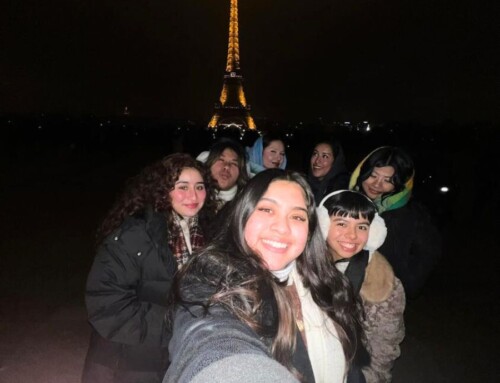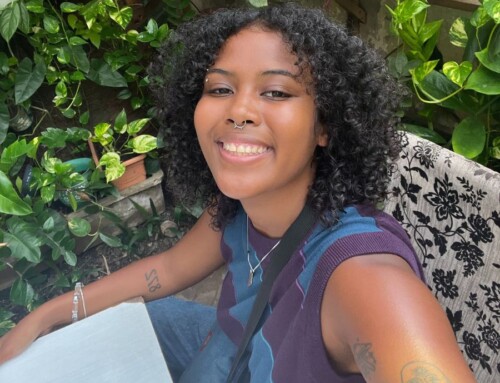By Natalie Glennon (UC Santa Barbara)
Overcoming impostor syndrome so you can make the most of your time abroad
As a lower-income, first-generation college student, I have struggled with impostor syndrome throughout my educational journey. This, and financial concerns, initially stopped me from considering study abroad. I assumed it was a privilege I couldn’t handle or afford. Luckily, I was wrong. Over the past six months, I’ve traveled more than I ever thought was possible and achieved my childhood dream of traveling to and living in Europe.
Let me be very clear—studying abroad wasn’t the fantasy I imagined it would be. At times, it was as uncomfortable and overwhelming as it was awe-inspiring and wonderful. And yet, I wouldn’t change a single thing.
Here are the practical tips that helped me work through my impostor syndrome and make the most of my semester abroad in the Netherlands.
1. Outline a plan before you leave
Because of my background and lack of travel experience, I saw studying abroad as my once-in-a-lifetime opportunity. That meant I had to make the most of it, but at the same time, I struggled with feeling that this opportunity wasn’t meant for someone like me. I was afraid of the unknown and felt ill-equipped to handle everything that could possibly go wrong.
While I wanted to push myself out of my comfort zone, I couldn’t shake the feeling I was in over my head.
I knew I couldn’t always control my feelings of self-doubt, but I could take action to ease some of my concerns and that started with outlining a plan for myself.
I researched travel resources, the host university, and all things Dutch. I also reached out to other students who had taken the program and asked their advice and about their daily life abroad. I spoke with a therapist about potential challenges that might come up and how I could manage them. Most importantly, I made plans to keep in touch with my support system and knew how to access resources to maintain my mental health while abroad.
I was lucky enough to go abroad with my longtime partner and my best friend—both of whom attended UCSB with me. While this did help me feel more secure, I still had to grapple with self-doubt throughout the entire process.
In all honesty, I never felt fully prepared, and I guess that’s natural. At some point you just have to take the leap and fake it until you make it.
2. Give yourself time to adjust
When I first arrived in the Netherlands, it felt like a fairytale. I was surrounded by snowy cobblestone streets, soaring cathedrals, and idyllic winter scenery. After a few days, however, the reality of it all started to hit me. I began experiencing waves of anxiety and sadness as impostor syndrome clouded my thoughts.
What am I doing here? I can’t handle this.
The only thing worse than feeling that way was how badly I beat myself up about it. During our weekly video chats, my mom would tell me to enjoy every minute. I knew she meant well, but I couldn’t help feeling guilty for struggling and not taking advantage of every moment.
What I really needed was self-compassion and time to adjust. Instead of suppressing or trying to ignore my uncomfortable emotions, I needed to process them and give myself permission to adjust at my own pace. I wasn’t a failure for wanting to stay in and watch childhood movies—I just needed time. Once I embraced that knowledge and approach, the transition became a lot more manageable.
3. Establish a new routine
Another factor that contributed to my discomfort was the lack of a new routine. I went from having a full schedule at UCSB to having classes just two days a week.
To fill the rest of my time with meaning and stability, I started taking workout classes. I started having friends over for dinner twice a week, and I started some new hobbies. These habits made a world of difference!
As quickly and gently as you can, look at your schedule and establish a new routine—one that takes into account your new environment and situation.
4. Travel with intention
One thing I wish I knew before study abroad is that travel burnout is a real thing. After being thrust into a new city with a plethora of places to go, I dove in headfirst and planned all the excursions I could think of.
I was influenced by excitement and the pressure to fully take advantage of this experience. Before I even adjusted to life abroad, I started focusing on traveling at all costs.
I didn’t realize I was experiencing travel burnout until I hit a wall during a weeklong trip to Germany. Suddenly, I felt unbearably fatigued and emotionally exhausted. I had pushed myself to the point where I wasn’t able to enjoy the trip. I realized I needed rest and familiar comforts, despite it being inconvenient for my plans and for the friends I was traveling with.
The truth is, inconvenience is a small price to pay when it comes to your own well-being. Taking breaks and scheduling days of rest was necessary for me to feel rejuvenated enough to enjoy traveling. Each subsequent trip became easier as I learned more about myself and what to expect from my travel experiences. By prioritizing sleep, creating flexible itineraries, and designating recovery time between trips, I eventually learned how to avoid travel burnout.
5. Accept that things will go wrong
Studying abroad delivers numerous options to expand your interests and try new things, and trying new things is hard when you’re focused on what could go wrong and convinced that you can’t handle it.
I made a lot of mistakes during my time abroad, and—spoiler alert—I actually could handle it!
While abroad, I got on the wrong buses, purchased the wrong train tickets, took spontaneous trips with people who turned out to be difficult to get along with, just to name a few mishaps. I faced situations that seemed daunting and unmanageable to me, and proved to myself that I’m stronger than I thought.
Despite my tendency to catastrophize, mistakes were never the end of the world. At best, they provided me with a valuable lesson and new skills. At worst, they gave me slightly embarrassing or amusing stories to tell.
In addition to all the things that went wrong, there were many experiences that went far better than I expected. I took my first creative writing course and had my short story published in an online magazine! While attending social events, I met and bonded with other international students who were struggling just as I was, and it gave me a strong sense of belonging to a special community. I couldn’t have known whether my efforts would be successful at the time, but I’m so glad I took those opportunities to step outside my comfort zone.
6. Celebrate your wins
One of the most impactful things I’ve done to challenge my impostor syndrome is to reflect on my accomplishments. By celebrating my wins, I can train my mind to focus on the positive and disprove my self-critical thoughts.
For example, it was a huge deal for me to navigate the local transit systems and language barrier, and it didn’t always go as planned. I slowly learned to stay calm under pressure and use the resources I have to effectively boost my confidence.
I also learned to set boundaries that prioritize my mental and physical well-being. Like other European universities, mine had a social life that sometimes emphasized drinking and smoking. Despite my desire to fit in, I acknowledged that there’s a difference between going out of your comfort zone and forcing yourself to conform to the expectations others have of you. Sometimes, self-care, in my case, meant saying no and recognizing when an activity didn’t interest me or I was too tired to participate.
By keeping my best interests in focus, in spite of the pressures around me, I reinforced my sense of self-trust and my own ability to take care of myself.
Finally, overcoming impostor syndrome is a constant work in progress. What’s important to me is knowing that I have the tools to be self-confident and extend compassion to myself through the process. Despite what my inner critic thinks, I am capable of great things. I think you are too!
Learn more about overcoming self-doubt on study abroad
- Read an introvert’s guide to studying abroad.
- Find your way by embracing abundance.
- Discover tips to maintain peace and a sense of balance on study abroad.












Leave A Comment